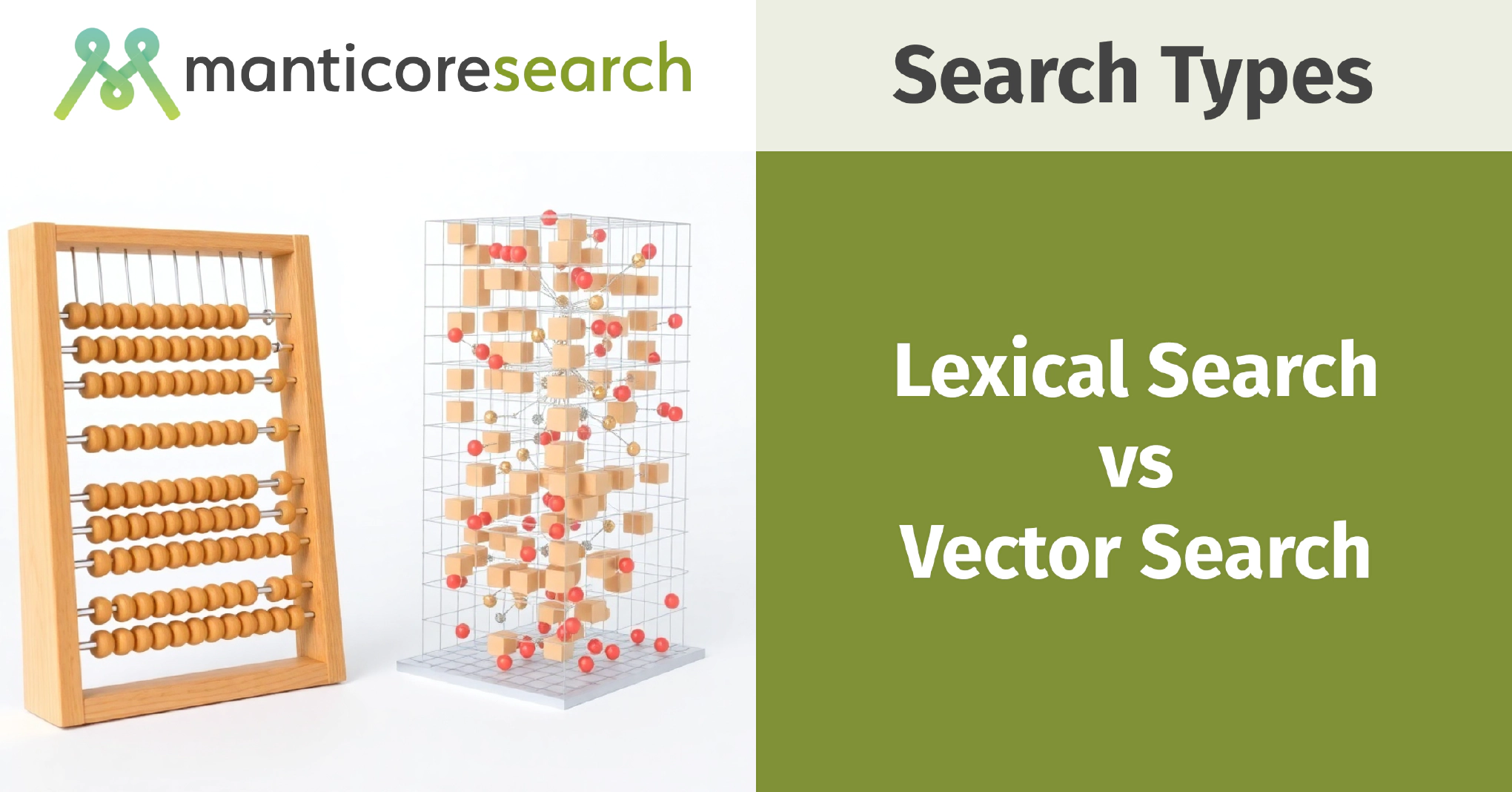In the world of information retrieval, two main search methods stand out: lexical search and vector search. While both aim to help users find relevant information, they work in fundamentally different ways. This article will break down the main differences, highlight their strengths and weaknesses, and help you understand when to use each approach.
What is Lexical Search?
Lexical search, also known as keyword search, is a straightforward method of finding exact matches for specific words or phrases within a document or database. It's particularly useful when dealing with organized data or when precise terminology is important. Lexical search typically involves:
- Exact keyword matching
- Boolean operators (AND, OR, NOT)
- Phrase matching
- Wildcard searches
This approach is efficient and predictable, especially when users know exactly what they're looking for.
Benefits of Lexical Search
- Straightforward: Easy to set up and understand.
- Efficient: Works well for organized data and specific queries.
- Predictable: Results are based on exact matches, making them easy to interpret.
- Quick: Generally fast for small to medium-sized datasets.
Drawbacks of Lexical Search
- Limited flexibility: May miss relevant results if wording doesn't match exactly.
- Lack of context: Doesn't understand the meaning behind words.
- Prone to noise: Can return irrelevant results if keywords are common or unclear.
Understanding Vector Search
Vector search is a more advanced approach that uses numerical representations of words or entire documents. Instead of looking for exact matches, it focuses on finding similarities between these representations. Key features of vector search include:
- Semantic understanding
- Similarity-based matching
- Dimensionality reduction techniques
- Support for natural language queries
This method allows for more nuanced and context-aware searches, even when the exact wording isn't known.
Benefits of Vector Search
- Flexible: Can find related content even without exact keyword matches.
- Context-aware: Understands relationships between words and concepts.
- Supports natural language: Works well with conversational queries.
- Multilingual capabilities: Can find similarities across languages.
Drawbacks of Vector Search
- Complex setup: Requires careful model selection and training.
- Resource-intensive: Can be demanding on system resources, especially for large datasets.
- Less precise: May sometimes return results that are conceptually related but not exact matches.
Lexical vs. Vector Search: Pros and Cons
| Aspect | Lexical Search | Vector Search |
|---|---|---|
| Precision | High for exact matches | High for semantic relevance |
| Flexibility | Limited to exact word matches | Very flexible, supports conceptual matching |
| Speed | Fast for small to medium datasets | Can be slower, especially for large datasets |
| Context Awareness | No context understanding | Strong semantic understanding |
| Setup Complexity | Simple to implement | Simple when you use one of existing models |
| Resource Usage | Generally less demanding | Can be resource-intensive |
| Best Use Cases | Structured data, specific terminology | Large text collections, natural language queries |
When to Use Each Approach
Lexical Search is ideal for:
- Querying structured databases
- Finding exact matches in specific fields
- Scenarios where precision is crucial, like legal or medical searches
Vector Search works best for:
- Searching through large volumes of unstructured text
- Supporting natural language queries
- Finding conceptually related content
Common Questions
Q1: What's the main difference between lexical search and vector search?
A: Lexical search focuses on finding exact keyword matches, while vector search uses numerical representations to understand meanings and find similarities between concepts.
Q2: When should I use lexical search?
A: Lexical search is ideal for querying structured databases, finding exact matches, and scenarios where precision is crucial, such as legal or medical searches.
Q3: What are the advantages of vector search?
A: Vector search offers more flexibility, can understand context and meaning, supports natural language queries, and can find conceptually related content even without exact keyword matches.
Q4: Can I combine lexical and vector search?
A: Yes, many modern search systems, like Manticore Search, combine both approaches to leverage their unique strengths and provide versatile search solutions.
Q5: Is vector search always better than lexical search?
A: Not necessarily. The best choice depends on your specific use case. Vector search is more flexible and context-aware but can be complex and resource-intensive, while lexical search is simpler and more efficient for precise queries.
Combining the Strengths of Two Approaches
In modern search technology, combining the exactness of lexical search with the contextual depth of vector search offers a robust solution, making it possible to deliver accurate and context-aware results across various applications.
Manticore Search integrates both lexical and vector search capabilities.
Whether your project calls for the precision of lexical matching or the nuanced, context-based results of vector search, Manticore Search provides a reliable toolkit. Its ability to incorporate both approaches makes it a strong choice for developers and businesses looking to build intelligent search capabilities without the overhead of fully managing vector databases.
The key takeaway? Knowing the differences between lexical and vector search is crucial for selecting the right approach for your project. While each has unique advantages, the combination can often offer the best results.
Ready to enhance your search? Try Manticore Search to see how this powerful engine can improve your project with a blend of lexical and vector search.
